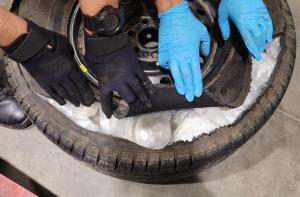
LOS ANGELES–U.S. Customs and Border Protection officers and agriculture specialists in coordination with Centers for Disease Control and Prevention personnel assigned to the Los Angeles International Airport, stopped two Russian travelers attempting to smuggle eight Pomeranian puppies into the United States.
The incident occurred on August 9, when two 27-year-old individuals arrived from Moscow and applied for admission into the United States. The travelers initially declared they were bringing four dogs for their vacation in Mexico.
Upon review of the four dogs’ medical history, CDC officials determined that the documentation accompanying the four dogs was fraudulent because the dogs’ ages were falsified on their rabies vaccination certificates and they were too young to receive rabies vaccination. Customs and Border Protection personnel discovered four additional puppies hidden in an abandoned carry-on bag left by the travelers in the inspection area.
The travelers admitted that they attempted to smuggle eight puppies into the U.S. without the proper import documentation with the intent of delivering them to waiting clients. One of the travelers stated that she expected to get paid $600 to smuggle the dogs into the U.S.
Both passengers were found inadmissible into the U.S., and returned to Russia, along with the eight puppies. Pomeranian is considered a luxury breed; the price of a puppy can go from $500 to up to $1,500 depending on the dog’s pedigree.
“According to the CDC, smuggled puppies is an issue of concern because of the high-risk of human exposure to deadly animal diseases including rabies,” said LaFonda Sutton-Burke, CBP Area Port Director of the Los Angeles International Airport. “We strongly advise travelers to become familiar with regulations about bringing their pets into the United States.”
Importation of cats and dogs is regulated by the CDC and the USDA. The CDC requires that dogs and cats be healthy upon arrival. Additionally, rabies vaccination is required for all dogs entering the United States from a country with high risk of the dog strain of rabies.
Puppies vaccinated against rabies for the first time must be vaccinated after they are 3 months (12 weeks) old and at least 4 weeks (28 days) before traveling. Therefore, the youngest that a puppy can be imported into the United States is 4 months (16 weeks) of age.
Adult dogs older than 15 months of age must show a history of previous rabies vaccinations (with the first given after 3 months old) and have a record of all booster rabies vaccinations. With this record, adult dogs may be imported immediately following booster vaccination, without the need to wait for 28 days.




